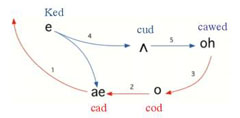March 17, 2006
Instilling linguistic anxiety in Raachester
 For
a scholarly work with the formidable list price of $620, the Atlas of North
American English (by William Labov, Sharon Ash and Charles Boberg)
has been getting some nice press attention since its launch earlier
this year. Last month NPR's "All Things Considered" featured a
thoughtful interview
with Labov, and now the Atlas has inspired a dialectological road
trip by Tim Sultan, a New York Times travel writer.
For
a scholarly work with the formidable list price of $620, the Atlas of North
American English (by William Labov, Sharon Ash and Charles Boberg)
has been getting some nice press attention since its launch earlier
this year. Last month NPR's "All Things Considered" featured a
thoughtful interview
with Labov, and now the Atlas has inspired a dialectological road
trip by Tim Sultan, a New York Times travel writer.
When Sultan approached Labov about using ANAE as a travel guide, Labov warmed to the idea, suggesting that he head northwest from New York City straight into the Inland North. The "Inland North" is Labov's designation for the dialect region that surrounds the Great Lakes in urban areas from western New York State to southeastern Wisconsin. The region is largely defined by the Northern Cities Shift, a set of vowel changes that makes "Dan" sound to others like "Deeean," "Don" like "Dan," "Dawn" like "Don," and so forth. (That cursory description hardly does the vowel shift justice; see here, here, and here for more discussion.)
Sultan followed Labov's advice and headed off for the area around Rochester — or, if you prefer, "Ratchester" or "Raachester," using pronunciation spellings that seek to approximate the fronting (and lengthening?) of the vowel in the first syllable according to the Northern Cities Shift. Sultan had no problem eliciting the shifted vowels from residents of the region, which Labov chalks up to a general state of dialectal unself-consciousness among speakers in the Inland North:
"Nobody with the Chicago-Rochester dialect makes a fuss about it," Professor Labov said. "They aren't as self-conscious or aware of it. Give a New Yorker or a Southerner a piece of paper with a word on it and ask them to say it, they'll start sweating."
Well, there's one way to get folks in Rochester feeling anxious about their dialect differences — more stories like this one from the Rochester Democrat and Chronicle, in which ANAE is tackled by a writer lacking Sultan's journalistic acumen:
Vowels speak volumes among 'funny-talking' Raachesterians
We may not know it, we may deny it and we might even be embarrassed about it, but a Pennsylvania linguist insists we talk funny in Raachester.
William Labov, a linguistics professor at the University of Pennsylvania in Philadelphia, calls our dialect the "northern city shift," claiming we say our vowels a bit more oddly than other parts of the country.
Needless to say, it's highly doubtful that Labov said that Rochester residents "talk funny," or that they say their vowels "a bit more oddly" than other speakers. But that's the way dialectal differences tend to get characterized in popular perception, so that's how Labov was apprehended by the Rochester reporter. Note also the accompanying sidebar that consoles readers: "Rochester isn't alone in having a dialect. Here are some ways other people talk." In common usage, terms like "dialect" or "accent" very often get equated with "talking funny," i.e., stigmatized divergence from perceived norms of pronunciation and usage. But works of dialectology like ANAE make no such value judgments on language variation. It's a shame, then, when reporters only hear what they want to hear.
Posted by Benjamin Zimmer at March 17, 2006 12:57 AM